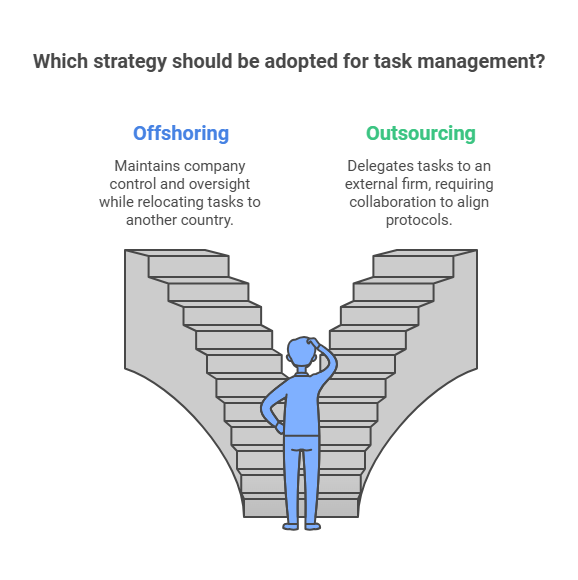Offshoring vs Outsourcing: Key Differences and Benefits
09 Dec 2024 By: Mary Dellosa
Updated

This article explores the key differences and benefits of offshoring and outsourcing. Understanding these terms helps businesses make informed decisions about operations. Lets now talk about the difference of offshoring vs outsourcing.
Understanding Offshoring and Outsourcing
Offshoring and outsourcing help companies cut costs and boost efficiency. Though similar, they differ. Understanding these differences is key.
Defining Offshoring
Offshoring involves relocating business processes to another country, mainly to save costs by leveraging cheaper labor. This often includes manufacturing, customer service, or custom software development.
For example, a U.S. company may shift production to Vietnam to reduce expenses. Despite its benefits, offshoring poses challenges like navigating regulations, cultural differences, and language barriers. Logistical issues, rising labor costs, and demands for ethical practices further complicate its long-term viability.
Defining Outsourcing
Outsourcing means hiring external experts to handle business tasks instead of managing them in-house. This saves time and lets teams focus on core priorities.
For example, outsourcing IT support to a service provider can improve efficiency and service quality. Specialized firms often bring advanced tools and methods, boosting innovation. However, outsourcing requires clear communication to avoid service issues. Companies must manage risks like data security and ensure quality while saving costs.
Distinguishing Between Offshoring and Outsourcing
Offshoring and outsourcing both boost efficiency but differ in approach. Knowing these differences helps businesses choose the best strategy.
Key Differences in Processes

The main difference is location and control. Offshoring moves tasks to another country but stays within the company. Outsourcing hands tasks to an external firm.
Offshoring keeps processes under company oversight, aligning with its values. Outsourcing shifts responsibility, requiring strong collaboration to bridge differing protocols.
Contrasting Business Models
Offshoring focuses on cutting costs while keeping control of production. It ensures company oversight but can face criticism for job losses in the home country.
Outsourcing highlights expertise. By hiring specialists, businesses improve quality and gain flexibility to scale. It often boosts innovation and brand reputation.
The Benefits of Offshoring
Offshoring provides many benefits that appeal to businesses. Here are the key advantages:
Cost Efficiency in Offshoring
Cost savings drive companies to offshore. Lower wages, cheaper utilities, and rent reduce expenses, boosting profit margins and enabling growth.
Favorable tax regimes and incentives add to the appeal. These savings free resources for reinvestment, supporting business expansion and innovation.
Access to Global Talent Pool
Offshoring expands access to global talent, allowing companies to recruit skilled workers from different countries. This boosts capabilities and drives innovation.
Diverse teams bring fresh ideas, creative solutions, and insights into global markets. This adaptability helps businesses stay competitive and responsive to trends.
The Advantages of Outsourcing
Outsourcing offers distinct advantages for businesses. Here are the key benefits to consider:
Flexibility and Scalability in Outsourcing
Outsourcing provides flexibility, enabling businesses to scale operations based on demand. By utilizing part-time customer service agents, companies can efficiently adjust support resources during peak periods without overcommitting to full-time staff.
During busy periods, companies can increase outsourced services without hiring staff. In slower times, they reduce services, cutting costs and boosting efficiency.
Focus on Core Business Functions
Outsourcing lets firms focus on core tasks by delegating non-essential work. This boosts performance, innovation, and competitiveness in key areas.
Specialized providers handle tasks like IT or payroll, improving quality. For example, Relevant Software offers expertise in software development, allowing businesses to delegate technical work. As another example, aggregator sites like RemotePad help companies choose the best payroll outsourcing firm for their business. Meanwhile, internal teams can then focus on high-value projects, driving growth and innovation.
Choosing Between Offshoring and Outsourcing
Choosing between offshoring and outsourcing is vital for a business’s success. Each offers unique benefits tailored to different goals and priorities.
Factors to Consider
When choosing, weigh your goals, budget, and resources against each option. Match the nature of the tasks with the approach that best fits their needs.
For specialized skills, offshoring to talent-rich regions works well. For streamlining, outsourcing tasks like IT or customer service is more efficient.
Trending Now
Offshore staffing is growing fast, with key trends shaping 2024. Companies now use multiple specialized providers for flexible and customized solutions. AI and automation are streamlining processes, cutting costs, and improving accuracy.
Cybersecurity is a top priority, as businesses demand stricter data protection. Knowledge process outsourcing (KPO) is also on the rise, handling complex tasks like research and innovation. Cloud-based outsourcing adds flexibility and security, making it ideal for managing IT and data needs. Adopting these trends helps businesses stay competitive and efficient.
Making the Right Decision for Your Business
The right choice depends on your company’s needs. Analyze objectives before deciding. In some cases, a hybrid approach may balance cost and efficiency.
Offshoring saves money but can face cultural and time zone challenges. Outsourcing offers flexibility but less control. Clear communication ensures success in either strategy. Understanding offshoring and outsourcing helps businesses craft plans that drive growth and efficiency while aligning with their goals and expectations.
As you consider the strategic benefits of offshoring and outsourcing for your business, remember that the right partner can make all the difference. HelpSquad BPO is here to streamline your operations with exceptional outsourcing services. Our bilingual virtual assistants and 24/7 customer service team are ready to enhance your business efficiency at competitive rates starting from just $8.50 per hour. Take the first step towards optimizing your business processes and Start Trial with HelpSquad BPO today. Let us help you focus on growth while we handle the complexities of customer support and back-office tasks.


